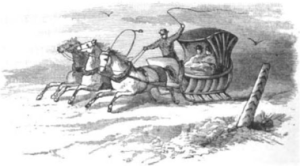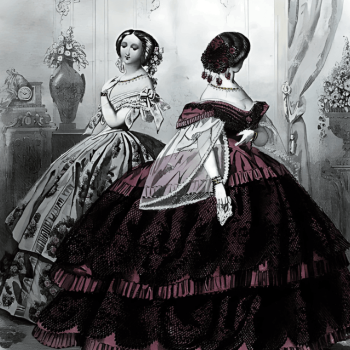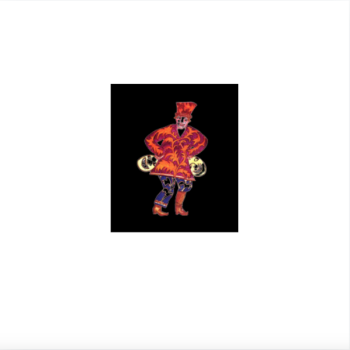GRUNYA
Winter 1840.
Vera and Baba Lena got out of the troika (three-horse sleigh) and entered a one-story wooden, house. The matron of the orphanage, an old woman named Anna Ivanovna, met them in a small hallway. Everything was so quiet that Vera thought the house was empty. She was very surprised when, upon entering the next room, she saw more than twenty girls, all neatly dressed in gray dresses, quietly sitting at work at long black tables. They all stood up in unison when the guests entered the room.

Troika.[1]
“Good morning, Elena Pavlovna!” they said, bowing as a single body.
“Hello, children,” Baba Lena answered, affably. “Is everyone healthy? Is everyone being a good student? Is my wool scarf knitted?”
“Everyone is healthy and trying to study!” was the friendly answer. “The scarf is almost ready. Zaitseva (Bunny) is tying it with a border.”
Zaitseva, a pretty girl, taller than the others, stood up and approached Baba Lena to show a large, purple woolen scarf, at the end of which her wooden hook still stuck out.
“Oh it’s exquisite,” said Baba Lena, patting Zaitseva on the head. “Thank you, Zaitseva! I brought you cabbages for this. Bunnies love to eat cabbages, don’t they? But look girls, I brought a friend for you—this is Verochka, my granddaughter. Do you want to play with her?”
“Oh yes! We want to play with her!” the girls shouted.
Vera wanted to hide away from all these unfamiliar girls behind her grandmother, but she refrained, remembering that Antonia constantly scolded her for this.
“Now go to the waiting room, children,” said Anna Ivanovna, “play with Verochka there.”
Everyone noisily got up, hid their work, and poured into the hall where they surrounded Vera.
The bigger girls knelt in front of her and hugged and kissed her. The little ones pulled her by the arms, by the dress; they touched her hair and the beads of the necklace around her neck. It seemed to Vera that they would tear her apart! Overwhelmed, confused, and ready to cry, she looked despairingly at the door of the classroom where Baba Lena remained.
Suddenly Zaitseva appeared. “What are you doing?” she shouted. “Leave Verochka alone! Why are you surrounding her like that and bothering her? Go away! She will come to you when she wants.”
The little ones fell off of Vera like peas, and only a few of the older girls remained. Zaitseva took Vera on her lap and calmed her down.
“Do you want to see pictures, Verochka?” she asked.
“Yes, please,” Vera answered. (In truth Vera only wanted one thing, and that was for Baba Lena to quickly come over and rescue her.)
Zaitseva led Vera by the hand into a room where there were rows of many beds with clean, white pillows, and gray blankets. When they sat her down on one of them, the bed seemed very hard, and the blankets were terribly rough.
“The blankets bite!” said Vera.
“Do they bite?” said the girls, laughing. “There is nothing to fear! We cover ourselves with these very blankets at night, and they have never bitten us. You see—they don’t even have teeth! Only dogs bite!”
“I think what Verochka means to say, is that these blankets are rough,” Zaitseva explained. “But this doesn’t mean anything to us. They are warm, and we are glad that we have them. At home, perhaps, we would have absolutely nothing with which to cover ourselves in the winter.”
“None of us are used to silk blankets!” said an older girl with freckles and with a pointed nose.
“Thank God that there are cloth ones!” Zaitseva answered, looking at the freckled girl angrily. “Verochka, if your grandmother hadn’t taken us here, and given us everything, many of us would have died from hunger.”
“How are you hungry?” Vera asked in genuine surprise. “Don’t you have a cook to make dinner?”
All the girls laughed at her again.
“How could they not!” the freckle-faced one cried again. “It’s just a pity that they have nothing to cook.”
“So what!” said Vera, feeling offended. “Does Butterfly cook your dinner?”
This statement produced such laughter, that not even all the persuasion and angry remarks of Zaitseva could not pacify it. The girls thought it was too funny Vera should call such a tall, plump old woman “Butterfly.”
“What butterfly?” they said. “Do butterflies cook food?”
“I’m talking about my Butterfly,” Vera muttered in embarrassment, on the brink of tears, “My grandmother.”
“Does your grandmother fly?” they said, continuing to laugh.
“If you don’t stop laughing now,” said Zaitseva, red hot with anger, “and don’t stop saying stupid things, then I will go and tell Anna Ivanovna.”
The girls got up and went to the corners, snorting.
“Your Butterfly is so kind, Verochka,” said Zaitseva, turning to Vera. “There is, perhaps, no other like her in the world! She takes care of us all. We owe her everything. She feeds us and clothes us, and teaches us. She has given me everything! If not for her—not only me, but my mother and little brothers and sisters—my whole family would have died of cold and hunger. We are poor. My father died, and my mother is sick. Where can we get money to live?”
“Is it really impossible to live without money?” Vera asked.
“Yes, darling,” Zaitseva sighed. “You can’t buy bread without money, and without bread, you have to die of hunger. We would have died if your Butterfly had not found out about us and came to us herself. She came, and first of all, fed us. Then she sent the doctor with medicine to my mother. Then she took me here and sent my two brothers to school. Then she gave my mother a job and clothed us all.” Tears formed in her eyes, and she was now blushing all over. “That’s what your Butterfly is like, Verochka!”
Vera looked at Zaitseva and listened as one listens to a fairy tale. She didn’t understand at that time the reason for her excitement, but for some reason, she felt that she was a good, kind girl.
“So you love my Butterfly?”
“I love her very much, Verochka!”
“What is your name?”
“My mother named me Grunya.”
“Can I call you that?”
“Of course, you can, my dear—why couldn’t you?”
“Grunya—Why did you tell me this story about your family? This is not good…I don’t like that you lived like this! Tell me more about you!”
“Okay…as long as your Butterfly doesn’t get angry.”
“Why should she be angry? Tell me everything! What kind of book is this? Show me!”
Grunya took out a nice book from a small chest that stood under her bed, but holding it in her hands, she completely forgot that she wanted to show the pictures. The book contained various animals and birds dressed as people, and under each drawing there was a caption in verse, often very funny. Grunya read them to Vera, and she laughed when looking at the pictures.
“Don’t you know how to read yet?” she asked.
“No,” Vera answered, blushing very much. “I’m not five years old, yet. My mother says it’s too early!”
“Of course! You are still very young. I thought you were older.”
“How old are you, Grunya?
“Oh! I’m an old woman! I am twelve years old—more than twice your age.”
Vera felt a deep connection with Grunya Zaitseva and invited her to come and visit her as soon as possible.
“As soon as I am able,” she answered with a smile. “We are only allowed out on Sundays and holidays.”
Vera began to count on her fingers how many more days were left until Sunday, and it seemed to her that it was so far away that it would never come. Grunya laughed, comforting Vera that three or four days would soon pass. Then Baba Lena came in with Anna Ivanovna, and Vera rushed to ask her for Grunya to come visit her on Sunday.
“Which Grunya?” asked Baba Lena. “Ah! Zaitseva? So you two have become friends.”
Baba Lena gently turned Vera to Anna Ivanovna, who readily agreed, and Vera rushed to kiss Grunya with joy.
“Verochka, did you and I forget our treat?” said Baba Lena. “Come children, let’s go to the hall. Everything is already prepared there.”
They returned to the hall, where the delicacies that Baba Lena brought stood on a tray. She herself distributed gingerbread cookies and apples to all the girls equally, not forgetting to put everything on a special plate for Anna Ivanovna.
“Well, children,” said Baba Lena, in bidding goodbye to the orphanage girls, “won’t you sing us a song?”
“Which one do you want to hear, Elena Pavlovna?”
“It doesn’t matter. Which one do you know better? How about a round dance, sung only in Russian, that’s just the way I like it.”
The girls all stood in a circle, holding hands, and sang in unison: “I’m burying and burying gold! I guard and guard pure silver.” Grunya, the lead singer, stood in the middle of the circle and directed the choir. Here, too, she distinguished herself.
It was fun for Vera to return from the shelter. She no longer thought about the sun, nor about winter, nor about summer. She only thought about the girls she had met, and about dear Grunya, who would come to visit her on Sunday, and again read her poems and sing her songs.
And, in fact, Grunya did come on Sunday and began to visit often and keep Vera busy with reading and stories. Grunya even tried to teach Vera how to knit wool scarves for her dolls.[2]
-
- MOTHERS & DAUGHTERS
- A LANTERN
- CHRISTENING OF THE DOLL
- DASHA & DUNYA
- GRUNYA
- NANNY NASTYA
- NANNY’S FAIRYTALE
- CONFESSION
- IN THE MONASTERY
- PREPARATIONS FOR THE HOLIDAY
- EASTER
- THE DACHA
- THE MELON POND
- MIKHAIL IVANOVICH
- THE WARLIKE PARTRIDGE
- LEONID
- NEW WINTER
- HISTORY OF BELYANKA
- THEATRES AND BALLS
- YOLKA
- REASONING
- ROAD
- CAMP
- IN NEW PLACES
- THE GRAY MONK
- VARENIKI
- THE TRIP TO DIKANKA
- WHAT HAPPENED IN THE DOLL HOUSE
- ANTONIA’S STORY
- “A WINTER EVENING”
- THE BLACK SEA
- CRIME AND PUNISHMENT
- PANIKHIDA
- PRINCE TYUMEN
SOURCES:
[1] Knox, Thomas W. The Boy Travellers In The Russian Empire. Harper & Brothers. New York, New York. (1887): 364.
[2] Zhelihovskaya, Vera Petrovna. How I Was Little. A. F. Devrien. St. Petersburg, Russia. (1898): 32-40.













